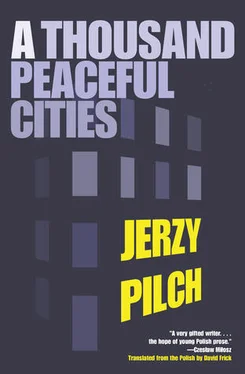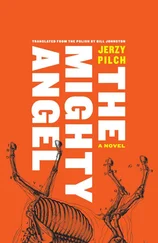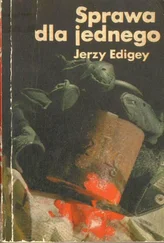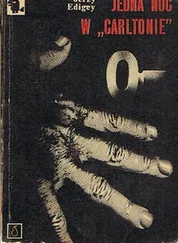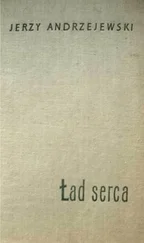“To you this night is born a child,
Of Mary, chosen virgin mild. .”
Father Pastor Potraffke finally stood on the lowest level of the ladder with fireworks shooting from every step. He touched the earth with his foot, and he suddenly fell silent, as if struck by a subterranean thunderbolt that came from the depths of the globe, from the basement of the Protestant Hall. The Pastor’s Wife played a moment longer, glanced once, twice in the direction of her husband, played a few chords more loudly and distinctly, as if wishing to persuade him to sing further, glanced once again with reflection and attention, and her divine shoulders, covered with a cashmere shawl, shook, her fragile fingers tore themselves suddenly from the keyboard, a blush covered her indescribable face.
“A child is born to you this night!” Pastor Potraffke suddenly bellowed. “Heathens! A child is born to you this night!” Apoplectic patches appeared on his chubby-cheeked face, and his eyes burned with an apostolic radiance. “Sons of philistines,” he shrieked at the boys sitting at the window, “sons of philistines! A child is born to you this night! And you,” in a fury he turned his face to the girls sitting by the door, “and you, daughters. .” he hesitated for a moment, “and you, daughters of Bolsheviks! A child is born to you this night!” he finished as if with a sort of relief. “Nothing in the world,” he wheezed, drowning in the ocean of his own impotence, “nothing, verily I say unto you, nothing will bring me to grant you confirmation. For the next time, that will be after the holidays, for the next time, six verses, not six, seven verses, by heart, of ‘From Heaven High I Come to You,’ seven verses of that festive hymn, which. . who composed it? Well, who?” Potraffke looked around the Protestant Hall with what seemed a more conscious glance. “Błaszczyk, let Błaszczyk tell us: who composed the festive hymn ‘From Heaven High I Come to You?’”
Straw-haired Joey stood up uncertainly, glanced at the thicker and thicker snow beyond the windows, at the white cross on the wall, at the Pastor’s Wife, who, with an exquisite motion of her head, was indicating the portrait of Martin Luther hanging on the wall, and at father Pastor Potraffke, who was blocking his view of that portrait, and he said, not quite asking, not quite answering:
“Father Pastor?”
“No, not me, you mutton-brain.” The furies left Pastor Potraffke, and he spoke with an almost normal, only slightly stifled, voice. “No, not me, mutton-head. It was our Reformer, Doctor Martin Luther. Yes, verily I say unto you, our Reformer, Doctor Martin Luther, composed that hymn on Christmas Eve in the year of our Lord 1534 in his home in Wittenberg. Sit down, Błaszczyk. I understand that the Lord receives various people at His table, but every time I look at you, Błaszczyk, I wonder. Verily, I say unto you, Błaszczyk,” Pastor Potraffke again raised his voice, “verily, I say unto you, Błaszczyk, I wonder whether someone like you can sit down to the Lord’s table.”
The Pastor’s Wife suddenly struck the keyboard, and we all eagerly sang the hymn which ended the lessons and services:
“Amen, Amen, Amen,
Jesus Christ is Lord. .”
We quickly recited the prayer, and we set off for houses that smelled of apples, poppyseed strudels, and floor polish.
Dressed in his old postal uniform, Father chopped huge beach logs in the courtyard.
“And what did you learn today?” he asked with a skepticism that was rare with him and, paradoxically, foretold a good mood.
“Nothing yet. I am only now going to go learn it. The pastor told us to learn seven verses of ‘From Heaven High I Come to You’ by heart. For the holidays,” I added with emphasis and hope.
For it now and then happened that Father, adhering to all of the principles formulated in Scripture, and subject, at the same time, to uncontrollable fancies, came to the conclusion that a contradiction had arisen between the commandments of the Bible and my homework assignments, and he would forbid me from doing them. “You aren’t going to solve any equations on Sunday,” he would say now and then. “You must keep the Sabbath holy.”
But this time it was different.
“Seven verses of ‘From Heaven High I Come to You.’” He struck with precision in just the right place, and the beach trunk was split asunder, revealing its almost brick-red interior against the background of the all-encompassing snow. “If I were you,” he said with his characteristic, non-binding tone, “if I were you, I’d learn all twelve verses. A person ought to strive for perfection. ‘Be ye therefore perfect, even as your Father which is in heaven is perfect.’”
•
I placed the hymnals on the table cloth with numbing symmetry. “Be ye perfect, even as the hand that places you is perfect,” I whispered. Mother sliced the bread that Mrs. Wantuła had baked in Goje. She sliced for a long time and attentively, and when she had finished, she first glanced at the table, then at Father, and she said with an indulgence that turned inexorably in the course of speaking into impatience:
“We’re missing apples, nuts, and Mr. Trąba.”
Then she went up to the window, moved the yellow curtain aside, and stared for a long time into the windy labyrinths of the Christmas Eve night, which was thickening from the constantly falling snow.
“The Baptists went to bed long ago. The lights are turned out, but we haven’t even sat down at the table yet,” she said, tearing her forehead away from the dark-blue windowpane.
Father, dressed in a white shirt, smelling of cognac and still inflamed from the afternoon fish-slaughter, stood by the table, took coins and banknotes from his wallet, and slid them under the tablecloth. The heretical habits of the Baptists didn’t make much of an impression, either on him or on us.
“The poor things,” was all mother would say from time to time, “the poor things! What will those poor things say at the Lord’s Judgment?”
“They won’t say anything. They will say that they had gotten lost, and that will be that. The Lord God forgives those who’ve gotten lost,” Małgosia Snyperek would respond every time over her cup of coffee, which she took “Turkish” style.
Especially when the Christmas holidays came, the Baptists gave the impression of being completely lost in their heterodox misfortune. They would sit down to their Christmas Eve meals at some Godlessly early hour, when it was still light. They didn’t share communion hosts, they didn’t give each other presents, they didn’t eat fish. True, they did have cabbage and white roll with milk among their Christmas Eve dishes, they hung apples and candy on the tree, but all of that was too little. The untimely slumber of the Baptists was too weak an argument to incline Father to put a sheepskin coat over his shoulders and set off to find Mr. Trąba, who was undoubtedly dawdling over wrapping his presents.
Only when Mother placed the tray with immaculately sliced bread on the table, when next to it she set homemade butter in a wooden butter-dish, when she placed apples on the piano, when she set crystal dishes with nuts and rum-flavored crescent rolls next to them, only then, when she took off the light-blue cretonne apron and began to fold it with slow and alarmingly precise motions, only then would Father raise his hand, with a gesture that was neither calming nor indicating an announcement, and say with preacherly passion:
“I know, I know, I know. The Catholics will be going to midnight Mass any minute now, and we still haven’t sat down to our Christmas Eve supper.”
And he would put on his sheepskin coat and hat and set off in a hurry to find Mr. Trąba, whom he would usually meet somewhere nearby anyway, often right next to the Rychter Department Store, or even closer. And so, most often they both would reappear much more quickly than we expected. Sometimes it would seem like a demonstration from a private conjuror’s séance. Father would stand in the doorway, go out, the doors would shut, the doors would open, and in that same moment they both would already be standing on the threshold, Father and Mr. Trąba, awaited for so many hours now already, and yet it was as if he had suddenly materialized out of thin air. And immediately Mr. Trąba would begin to explain himself, to apologize for being late. Presents awkwardly wrapped in gray packing paper and tied with faded ribbons would pour from under his coat. He would hand them to us right there in the hall, as if flummoxed by his own awkwardness and uncertain whether, on account of that awkwardness, the presents would last to the end of the supper.
Читать дальше
